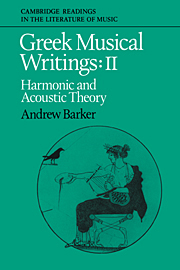Book contents
- Frontmatter
- Contents
- Acknowledgements
- Abbreviations, texts and typographic conventions
- Introduction
- 1 Pythagoras and early Pythagoreanism
- 2 Plato
- 3 Aristotle
- 4 The Aristotelian Problemata
- 5 The Peripatetic De Audibilibus
- 6 Theophrastus
- 7 Aristoxenus
- 8 The Euclidean Sectio Canonis
- 9 Minor authors quoted by Theon and Porphyry
- 10 Nicomachus
- 11 Ptolemy
- 12 Aristides Quintilianus
- Bibliography of works by modern authors
- Index of words and topics
- Index of proper names
1 - Pythagoras and early Pythagoreanism
Published online by Cambridge University Press: 06 January 2010
- Frontmatter
- Contents
- Acknowledgements
- Abbreviations, texts and typographic conventions
- Introduction
- 1 Pythagoras and early Pythagoreanism
- 2 Plato
- 3 Aristotle
- 4 The Aristotelian Problemata
- 5 The Peripatetic De Audibilibus
- 6 Theophrastus
- 7 Aristoxenus
- 8 The Euclidean Sectio Canonis
- 9 Minor authors quoted by Theon and Porphyry
- 10 Nicomachus
- 11 Ptolemy
- 12 Aristides Quintilianus
- Bibliography of works by modern authors
- Index of words and topics
- Index of proper names
Summary
The ‘Pythagoras’ whose life and doctrines are profusely described in documents of late Hellenistic and Roman times is more a myth than a man. There was a real Pythagoras, but surprisingly few early writers mention him, and when the layers of legend, prejudice, philosophical reinterpretation and plain forgery have been peeled away from the stories that later sources tell, little historical fact remains. Of the points that seem relatively secure, the following have some relevance here.
Pythagoras was born in Samos around the middle of the sixth century b.c. He migrated, probably for political reasons, to the colonies of the Greek West in southern Italy, and settled in Croton. There his teachings attracted a group of followers, and it seems clear that what united them was a way of life defined primarily by a set of moral and ritual injunctions, rather than anything recognisable as philosophical ‘doctrine’. The main aim of this way of life was the purification of the soul, whose fall from perfection and transmigration through a series of incarnations was asserted by Pythagoreans from the beginning of the tradition, and whose ultimate return to a condition of unblemished divinity might be achieved through these purifying practices. It also had political implications. Pythagoreans formed a governing elite at various times in several Italian cities, and were not always popular: a violent revolt against them in Croton is well attested.
- Type
- Chapter
- Information
- Greek Musical Writings , pp. 28 - 52Publisher: Cambridge University PressPrint publication year: 1990
- 1
- Cited by



